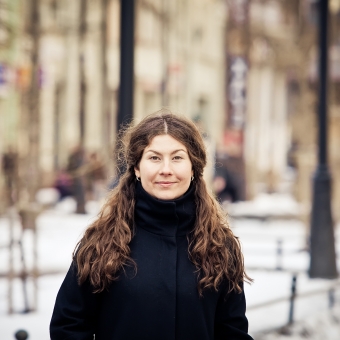
Why do we need the verb aspect?
We are all aware of the abundance of tenses in English. Or in French. Or in Spanish. There is something appealing about it, but there are some hidden difficulties as well. How is it possible to remember all these – the past simple, the past continuous, the present perfect, the past perfect and continuous …If we speak about the romance languages, we can also add such forms as Modo Subjuntivo/Subjonctif that express similar ideas but subjectively…
In this respect Russian – you are not going to believe it – is way easier!
We have only three tenses: the past, the present, the future. But let us make a pause and think: would we be able to express our ideas fully if we had only these forms? It would not have been interesting for us to talk!
To make ideas sound precise, beautiful, interesting, different, we can use an excellent means that Russian offers – the verb aspect! Here the verb aspect is our best friend, not a bitter enemy. Despite the common opinion, the verb aspect exists to make our life easier instead of complicating it.
What is the Verb Aspect and How to Learn It?
Please do not think that the verb aspect is a complicated grammatical theme. I have taught Russian to several hundreds of students. From different countries and almost all the continents. That is why I know that it is quite possible to avoid many problems with the verb aspect, if we explain and practise the meaning and use of the aspect from the very beginning. But we need to remember about the following conditions.
Condition One:
First it is necessary to learn and practise the basics of the grammatical topic and only then focus on more complex cases.
Condition Two:
The verb pairs (“the continuous aspect–the perfect aspect” – the order in which they are given in any textbook, grammar reference, etc.) should be learnt by heart. Even if you are reluctant to learn them – nothing can be done about it. The verb, especially in everyday speech, is the core of a sentence. If you pay enough attention to it in the beginning, we will never regret it. Of course, at first we need a comparatively small number of verbs (it is necessary to use all the grammatical forms, i. e. both the continuous and perfect forms in the present, past and future), but then the list should be expanded.
This article is about the basics of the verb aspect.
All Russian verbs have either the continuous (НСВ) or the perfect aspect (СВ). In other words, when you make a phrase, you choose both the time and the aspect of the verb. The Russian verb does not exist without the aspect!
НСВ verbs express an action in progress. СВ verbs denote an action with a limit (as a rule, we say “result”).
Compare:
Он читает книгу (НСВ): we picture a person sitting at a table in the library or in a comfortable armchair at home. There is an opened book in front of him, he is looking through the text page by page – in other words, we see a process, duration.
Он прочитал книгу (СВ): the reading process is finished, the book is closed and put aside, it has already been returned to the shelf or the library. Here we have a limit, result, the end of the action.
So when you make up your own sentence using a verb, you should choose the aspect – continuous or perfect. For example, the English verb “read” corresponds to the pair «читать (НСВ)/прочитать (СВ)». If you would like to speak about the process, you will take «читать» (НСВ); if it is a completed action, a result, you will use «прочитать» (СВ).[1]
Let us take another example with “писать (НСВ)/написать (СВ)”.
Она пишет письмо (НСВ) – a process, duration: lines are appearing one by one on the paper.
Она писала письмо два часа (НСВ) – we have a process again but now it is in the past. This sentence gives us the following information: for a certain period of time an unknown girl was sitting at the table or computer using a piece of paper and a pen. Was the letter finished? Was it sent to the receiver? This sentence does not answer these questions.
Another example describes a different situation:
Она написала письмо (СВ). This sentence tells us that the action is completed, a certain result: the letter is finished, it is on the table in the envelope or has already been sent.
In Russian there is a small number of two-aspect verbs (verbs which have the same form for the continuous and perfect aspect) and a few one-aspect verbs (verbs which do not form a pair and can be used only in one aspect). We are not going to focus on them now as it would have been too early. Now we are speaking about verbs which make up aspect pairs since there is a majority of such verbs in Russian and in the beginning it is important to see the difference between the continuous and perfect aspects and learn how to use them.
The formation of the Perfect and Continuous Aspects
According to the type of formation the verbs that make up aspect pairs can be divided into 3 groups:
1. prefix, e.g.: читать – прочитать
2. suffix, e. g.: рассказывать – рассказать
3. suppletive forms, e. g.: говорить – сказать
Let us talk about each group in more detail:
- The verbs of the first group are made “perfect”. This means the perfect aspect is derived from the continuous aspect by means of a prefix (про-, с-, по-, вы- , etc.).
It is not possible to guess the prefix of the perfect aspect! So you should learn the following minimum:
читать – прочитать, писать – написать, рисовать – нарисовать, чертить – начертить, делать – сделать, фотографировать – сфотографировать, петь – спеть, танцевать – станцевать, играть – сыграть, уметь – суметь, мочь – смочь, есть – съесть (что-то конкретное; например, съесть яблоко), есть – поесть, пить – попить, пить – выпить (что-то конкретное: например, выпить стакан сока), мыть – помыть (или вымыть), звонить – позвонить, думать – подумать, стучать – постучать, дарить – подарить, целовать – поцеловать, завтракать – позавтракать, обедать – пообедать, ужинать – поужинать, знакомиться – познакомиться, менять – поменять (или обменять), смотреть – посмотреть, слушать – послушать, ставить – поставить, знать – узнать, видеть – увидеть, слышать – услышать, готовить – приготовить, ждать – подождать, платить – заплатить (или оплатить) и, наконец, учить – выучить.
Irregular: покупать (НСВ) – купить (СВ)!
- The second group is quite the opposite. Here the verbs are made “imperfect”: the perfect aspect verbs take a prefix and form the continuous aspect (“imperfect”). Like in the first group, we do not know which prefix we need to make a pair for each verb, we can guess or deduce. So let us remember the following minimum:
давать – дать, уставать – устать, вставать – встать, открывать – открыть, забывать – забыть, рассказывать – рассказать, показывать – показать, рассматривать – рассмотреть, спрашивать – спросить, решать – решить, изучать – изучить, получать – получить, повторять – повторить, бросать – бросить, кончать – кончить, отвечать – ответить, отправлять – отправить, поздравлять – поздравить, понимать – понять, обнимать – обнять, начинать – начать, вспоминать – вспомнить, выбирать – выбрать. Ну а если вы это уже выучили, то можно и отдыхать – отдохнуть!
- The verbs of the third group are special and do not follow any rules. There is only one thing – the continuous and perfect aspects are not alike. That is why they should be learnt by heart. Do not worry, there is a very small number of such verbs:
говорить – сказать, брать – взять, класть – положить, искать – найти, ловить – поймать.
The Verb aspect in the Present, Past and Future
In the beginning it is essential to understand and remember:
● continuous verbs have three tenses: the present, past and future, e.g.:
Я читаю журнал;
Завтра я буду читать журнал;
Вчера я читал журнал.
● perfect verbs have only two tenses: the past and future, e.g.:
Я прочитал твое письмо;
Завтра я прочитаю твое письмо.
It is connected with the meaning of the aspects: the perfect aspect denotes a completed action, the continuous aspect – a process. In the present we deal with a process and never with a result (compare: я читаю, ты смотришь, он ест…). The result can be either achieved (and we use the past, e.g. «Он съел яблоко»), or will be achieved in the future (then we use the future, e.g.: «Он съест яблоко»).
Basic Meanings of the Verb Aspects
In order to understand and remember the meanings of the verb aspects in Russian, think which verbs exist in your mother tongue and which you need to learn.
There are three basic meanings of the continuous aspect: the first – “a process/ duration”, the second – “a regular/ repeated action” and the third – “a fact”. The perfect aspect has two meanings – “a result” and “a single action” (we will take them as one meaning as there is very little difference between them).
Compare:
|
Continuous Aspect |
Perfect |
|
а) a process: Я (долго/три часа) писал письмо. |
а) a result + a single action: Я написал письмо. |
|
б) a regular action: Обычно я пишу письма вечером. Он всегда читал перед сном. |
|
|
в) a fact - Что ты делал вчера? - Писал письмо брату, а потом смотрел фильм. |
|
The first and the second meanings of the continuous aspect and the only meaning of the perfect aspect are not very difficult for learners of Russian: it is enough to understand the logic and remember a couple of examples.
Он читал, читал роман – и наконец прочитал (the first part has the continuous aspect as it is a process; the second part has the perfect aspect since the action is finished).
Он открывал, открывал дверь – и наконец открыл (the same).
По утрам он просматривает газеты (the continuous aspect is used as a regular action is described).
Он прочитает эту книгу за два дня (the perfect aspect is used, the future: the sentence says that the result will be achieved in two days).
Он каждую неделю играет в теннис (a regular action = the continuous aspect).
По вечерам он будет читать и гулять (a regular action in the future, the continuous aspect).
Besides, these aspects can be used with certain words that help to choose the necessary form.
Let us write them in the table:
|
Continuous Aspect |
Perfect Aspect |
|
а) долго (for a long time) |
в конце концов, наконец (finally) |
|
2, 3, 4 … часа (дня, года…) 2,3,4… hours (days, years) |
вдруг, сразу, неожиданно (suddenly, immediately) |
|
весь день (весь вечер, всю ночь) all day (all night) |
|
|
всю жизнь (all your life) |
|
|
б) обычно, часто, редко, иногда, каждый день, всегда, никогда (usually, often, seldom, sometimes, every day, always, never) |
|
Learners of Russian tend to have problems with the continuous aspect in the meaning of “a fact”. I recommend that you pay a special attention to it, listen and remember how Russians use it and reinforce this meaning with a lot of examples. For example:
Вчера вечером я стирал, мыл посуду, готовил ужин, а потом смотрел телевизор.
Днем я ходил в Эрмитаж, а потом обедал с русским другом в одном кафе.
Спасибо, я не хочу кофе, я уже пил кофе сегодня утром.
These sentences give general information about what the speaker did. In this case you are not interested in the result or completion.
It is important to remember that continuous aspect of “a fact” can be substituted by the perfect aspect of “a result”. Here the meaning of the sentence will change (learners normally ignore this change). When a Russian says: «Я постирал, помыл посуду, приготовил ужин», he or she means – “I’ve finished, I’m free!”, «Я сходил в Эрмитаж» means finally going there and they are happy now!
After you have learnt these aspect pairs and done exercises, we will feel more confident while using them. Our qualified teachers of Russian will be happy to make the learning process engaging and effective. On our website you can choose a teacher and sign up for a trial with him or her.
Good luck!





























